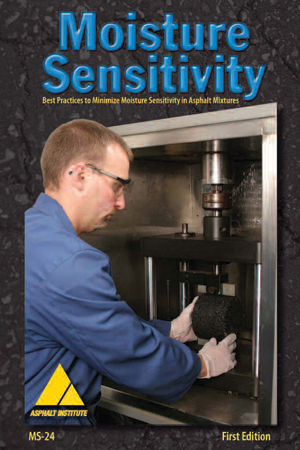 Moisture damage, or stripping, of asphalt pavements is a serious problem. A Colorado Department of Transportation (DOT) survey determined that 82 percent of the nation’s DOTs require some sort of antistrip treatment. Of those agencies that treat, 56 percent use liquids, 15 percent use liquid or lime, and 29 percent treat with lime only.
Moisture damage, or stripping, of asphalt pavements is a serious problem. A Colorado Department of Transportation (DOT) survey determined that 82 percent of the nation’s DOTs require some sort of antistrip treatment. Of those agencies that treat, 56 percent use liquids, 15 percent use liquid or lime, and 29 percent treat with lime only.
Moisture damage can show itself in various forms such as: adhesion failure between asphalt and aggregate; moisture-induced cohesion failure within the asphalt binder; cohesion failures within the aggregate; emulsification of the asphalt; and freezing of entrapped water. With multiple mechanisms contributing to moisture damage, there is no one solution for all the problems.
Adhesion Failures
The most common form of moisture damage is the adhesion failure between asphalt and aggregate. Since that failure is primarily a result of the two materials not forming a chemical bond which holds up in the presence of water, there are both chemical and physical treatments that improve compatibility. The addition of either a liquid anti-strip or lime creates a chemical change, while polymeric aggregate treatment promotes physical changes to improve compatibility and strengthen the asphalt to aggregate bond.
Physical Property Considerations
Although addressing the adhesive bond between the asphalt and aggregate is critical, there are other recommended precautions to minimize moisture sensitivity. The physical properties of the mixture are the next step in the line of defense. First, targeting adequate volumetric properties in the mix design will ensure that the mixture has both a thick asphalt film around the aggregate particles and a lower air void content so that the mixture is relatively impermeable to water.
Second, the cleanliness of the aggregates also plays a role in moisture sensitivity. Excessive dust on aggregate surfaces can act as a bond breaker and prevent the asphalt from forming a strong bond with the aggregate. Also, the percentage of clay in the aggregate can have a major effect because clay promotes the inclusion of water in the mixture.
Testing Considerations
In the mix design phase, there are several laboratory test methods to evaluate the potential moisture sensitivity of the mixture. These test methods are used as an indication for incompatibility between the asphalt binder and aggregate. The most common laboratory test used throughout the United States is the indirect tensile test. Others tests include: compression testing, retained stability, wheel tracking, and boil testing.
If the designed mixture is moisture sensitive and the sensitivity cannot be managed by the introduction of new materials, there are treatment alternatives. Those treatments are the addition of either a liquid antistrip or hydrated lime, as well as the polymeric treatment of the aggregate. Once a treatment method is selected, laboratory testing is repeated to ensure that resistance to moisture damage has been achieved.
While the majority of states that perform moisture testing do so solely during the mix design phase, 38 percent also perform some form of field acceptance testing.
Construction Considerations
Even when a mixture has been designed properly, there are some best practices for constructing the pavement. These best practices are: minimizing segregation and moisture content, while maximizing cleanliness of the aggregate stockpiles; maintaining proper cold feed rates, aggregate drying, and adequate mixing; using a transfer device to minimize segregation; and achieving proper mat compaction and proper drainage.
Using the available laboratory tests, additives, treatments and best practices in the field, moisture susceptibility can be managed.
For more information on moisture sensitivity of asphalt pavements and the steps necessary to minimize it, obtain a copy of MS-24, Moisture Sensitivity, available from the Asphalt Institute’s online store.













